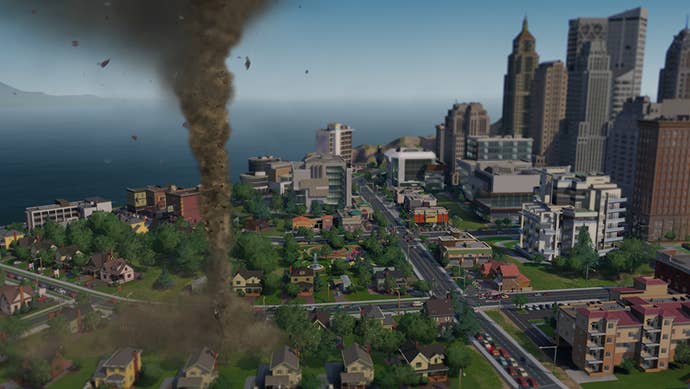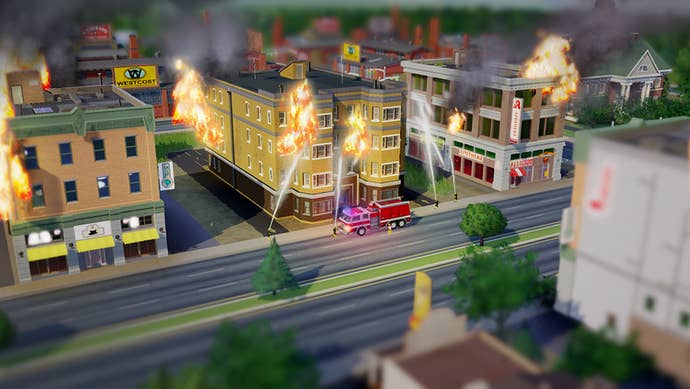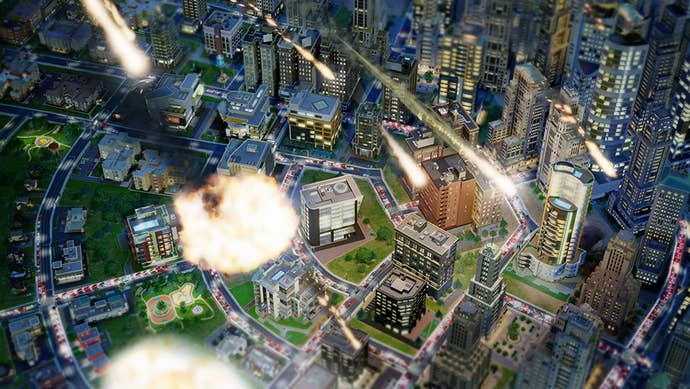2013 in Review: The Year SimCity Died
Hopes were high for this year's SimCity reboot, but things didn't quite go according to plan. What went wrong -- and can the once-great brand ever recover?
This article first appeared on USgamer, a partner publication of VG247. Some content, such as this article, has been migrated to VG247 for posterity after USgamer's closure - but it has not been edited or further vetted by the VG247 team.
Ask a longtime gamer about SimCity a couple of years ago and you'd probably be greeted with a far-off, wistful look and perhaps an anecdote or two about the effect natural disasters had on the population's willingess to get up and go to work each morning.
Ask that same person today, though, and you'll likely get a very different response due to the poor franchise having been dragged through the mud, then stomped on repeatedly until little more than a bloody, filthy husk remained.
Although this year's SimCity reboot from EA and Maxis was primarily to blame for this unfortunate situation, problems for the brand started last year with the release of SimCity Social on Facebook -- a game which, for a short while, managed to convince even the most staunch haters of social games to give it a fair shot.
Unfortunately, SimCity Social was, not to put too fine a point on it, a fetid turd of a game, consisting of every obnoxious social free-to-play game cliché in the book while stripping out every last bit of the series' signature depth and complexity -- and then having the gall to slap the SimCity name on itself. Energy systems, enforced begging for items, meaningless gameplay and a total lack of consequence for your actions -- SimCity Social managed to offend longtime fans of SimCity in almost every possible way. And to make matters worse, there was this commercial -- possibly the very worst video game commercial ever created.
SimCity Social was, not to put too fine a point on it, a fetid turd of a game.
The fact the commercial itself was horrendously bad wasn't the worst thing about it, though; it was the fact that it made promises that simply weren't kept. The core message of "more city, less ville" was intended to be a not-very-subtle dig at Zynga's CityVille, a game that, while popular, was totally lacking in depth and meaning beyond logging in every day to click on everything. In other words, SimCity Social initially looked like it might provide the experience that CityVille couldn't: a more realistic citybuilding experience that included elements that have come to define the SimCity experience over the years such as crime, pollution and other management demands. What SimCity Social actually provided was, unsurprisingly, a game that was totally lacking in depth and meaning beyond logging in every day to click on everything. It closed less than a year after its original release, and good riddance to it.
With SimCity Social proving to be such a disaster, all eyes turned to EA and Maxis' upcoming standalone SimCity reboot. Hopes were high, though following the spectacular mishandling of the brand with SimCity Social, fans were also rightly somewhat cautious, particularly as it emerged that the new game would be designed with a persistent online connection in mind.
This persistent online connection proved to be the source of not just one but several different controversies. Following Diablo III's troubled launch in 2012, many players were hesitant to jump on board with another game that had historically offered offline single-player options but was now expecting them to remain constantly connected to the Internet. EA's justification for the always-online nature of SimCity was not that it was a form of digital rights management as many tend to accuse this type of model as being, but instead that it was a symptom of the game being designed primarily as a multiplayer title, and that the new "GlassBox" engine for the game was, in fact, offloading a number of simulation calculations to EA's servers rather than placing heavy demands on the player's own computer.
It didn't help that the multiplayer functionality of SimCity simply wasn't very good, regardless of the reasoning behind its online-centric nature.

The latter claim in particular was proven fairly comprehensively to be false by various modders and commentators, but the multiplayer aspect, too, was something that not all that many people seemed to want.
It didn't help that the multiplayer functionality of SimCity simply wasn't very good, regardless of the reasoning behind its online-centric nature. Interactions between players in a region were minimal, limited to exchanging various services and goods between one another rather than having a direct and tangible impact on each other's game. Even the chat system was poor, consisting of an asynchronous message board that was not at all obvious, and which really did not prove particularly conducive to cooperating with one another. It played more like a Facebook-based social game than something with true multiplayer, and despite Maxis' protestations that the game had always been designed in this way, it felt like an afterthought that didn't need to be there; in the time I spent playing the game, I never once felt like I was actually playing with others on anything more than an incredibly superficial level.
Post-launch brought more broken promises. Disappointed SimCity fans who had continued to give the game a fair chance despite its numerous issues raised complaints about a number of gameplay features, chief among which was the relatively small plot sizes on which it was possible to build one's city. It was all too easy to completely fill all the available space and then be unable to expand, whereas past installments of the SimCity series had provided areas to build on ranging from the very small to the enormously large, catering to all skill levels and mayoral styles.
Maxis' previous comments don't provide much hope for the statement that the team is "exploring the possibility" of an offline mode.

Maxis initially claimed to be looking into the possibility of implementing larger city plots for a future expansion of the game, but later retracted these comments, noting that "the system performance challenges we encountered would mean that the vast majority of our players wouldn’t be able to load, much less play with bigger cities" and that the team had "tried a number of different approaches to bring performance into an acceptable range, but just couldn’t achieve it within the confines of the engine."
Unsurprisingly, these comments don't provide much hope for the statement in the same blog post that the team is "exploring the possibility" of an offline mode, particularly given that these "explorations" were announced back in October of this year and nothing whatsoever has been heard on the subject since, while the aforementioned modders have found numerous means of circumventing the online requirement. Given that the majority of the appeal of this kind of game is playing solo rather than multiplayer it's frankly baffling why Maxis and EA have consistently refused to implement offline play even amid constant community demand ever since launch. It just reeks of stubbornness and a desire to push an agenda that no-one but EA wants.
Judging by the comments on SimCity's news blog, people are still playing the game -- and in sufficient enough numbers to justify Maxis continuing to release regular updates and a full expansion pack -- but after the initially disastrous launch, a lot of other people closed the game, never went back and will now be significantly more hesitant to trust future incarnations of the franchise -- if indeed there are any after this notorious debacle.
Instead, what's more likely to happen is that Maxis continues to support the game for a year or two more, then EA will quietly shut down the servers, never speak of it again and conveniently forget that the SimCity series ever existed. It wouldn't be the first time this had happened, and it probably wouldn't be the last.
To say that SimCity "died" this year is admittedly hyperbolic, but it is perhaps fair to say the future of the series is somewhat in doubt.

To say that SimCity "died" this year is admittedly hyperbolic, given that there are still people playing, but it is perhaps fair to say the future of the series is somewhat in doubt. Lucky, then, that there's a whole host of alternative games that prospective virtual mayors may find themselves enjoying.
If you're really after a good traditional citybuilding experience, you're best off grabbing a copy of the new SimCity's predecessor SimCity 4, which is still available, or perhaps Cities XL. Alternatively, investigating more in-depth, specialized simulations of particular aspects of city management such as Cities in Motion, its sequel or the newly revamped Transport Tycoon on iOS may prove rewarding.
You may also wish to check out promising-looking upcoming or Early Access games such as the medieval-themed citybuilder Banished, Double Fine's Dwarf Fortress-esqueSpacebase DF-9, Simon Roth's Maia or Gaslamp Games' Clockwork Empires, all of which provide something of a twist on the usual management sim formula to varying degrees.
SimCity was once the best -- and, for some time, only -- in its class. Those days are long gone, but for those of us who enjoy building things and then watching them thrive or crumble, there's still plenty out there to enjoy -- you just might have to look further afield than the once-respected SimCity brand.

